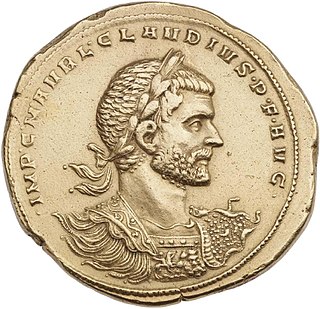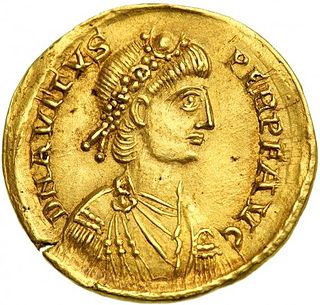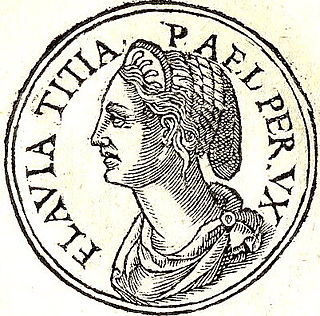Pope Felix I was the bishop of Rome from 5 January 269 to his death on 30 December 274.

Commodus was Roman emperor jointly with his father Marcus Aurelius from 176 until his father's death in 180, and solely until 192. His reign is commonly considered to mark the end of the golden period of peace in the history of the Roman Empire known as the Pax Romana.

Marcus Aurelius Claudius 'Gothicus', also known as Claudius II, was Roman emperor from 268 to 270. During his reign he fought successfully against the Alemanni and decisively defeated the Goths at the Battle of Naissus. He died after succumbing to "pestilence", possibly the Plague of Cyprian that had ravaged the provinces of the Empire.

Eparchius Avitus was Roman emperor of the West from July 455 to October 456. He was a senator of Gallic extraction and a high-ranking officer both in the civil and military administration, as well as Bishop of Piacenza.

Pertinax was a Roman soldier and politician who ruled as Roman emperor for the first three months of 193. He succeeded Commodus to become the first emperor during the tumultuous Year of the Five Emperors.

Marcus Didius Julianus was Roman emperor for nine weeks from March to June 193, during the Year of the Five Emperors.

Ulpius Cornelius Laelianus was a usurper against Postumus, the emperor of the Gallic Empire. His revolt lasted from approximately late February to early June 269.

Balbinus was Roman emperor with Pupienus for three months in 238, the Year of the Six Emperors.

Tiberius Claudius Pompeianus was a politician and military commander during the 2nd century in the Roman Empire. A general under the Emperor Marcus Aurelius, Pompeianus distinguished himself during Rome's wars against the Parthians and the Marcomanni. He was a member of the imperial family due to his marriage to Lucilla, a daughter of Marcus Aurelius, and was a key figure during the emperor's reign. Pompeianus was offered the imperial throne three times, though he refused to claim the title for himself.

The Historia Augusta is a late Roman collection of biographies, written in Latin, of the Roman emperors, their junior colleagues, designated heirs and usurpers from 117 to 284. Supposedly modeled on the similar work of Suetonius, The Twelve Caesars, it presents itself as a compilation of works by six different authors, written during the reigns of Diocletian and Constantine I and addressed to those emperors or other important personages in Ancient Rome. The collection, as extant, comprises thirty biographies, most of which contain the life of a single emperor, but some include a group of two or more, grouped together merely because these emperors were either similar or contemporaneous.

The gens Flavia was a plebeian family at ancient Rome. Its members are first mentioned during the last three centuries of the Republic. The first of the Flavii to achieve prominence was Marcus Flavius, tribune of the plebs in 327 and 323 BC; however, no Flavius attained the consulship until Gaius Flavius Fimbria in 104 BC. The gens became illustrious during the first century AD, when the family of the Flavii Sabini claimed the imperial dignity.

June 21 - Eastern Orthodox Church calendar - June 23
Avitus is a cognomen used by various Romans of Imperial times. Although some of them may have been related, there is no evidence that they constituted a distinct family.

In the Historia Augusta, Postumus the Younger figures as one of the so-called Thirty Tyrants who usurped power against the Roman Emperor Gallienus. According to the pseudo-historical list of 'Thirty Tyrants', the Emperor of the Gallic Empire Postumus had a son, also called Postumus, whom he nominated to be first caesar, and later even augustus and co-ruler. Postumus the Younger would have been killed together with his father in 268, during the rebellion of Laelianus.
The gens Aelia, occasionally written Ailia, was a plebeian family in Rome, which flourished from the fifth century BC until at least the third century AD, a period of nearly eight hundred years. The archaic spelling Ailia is found on coins, but must not be confused with Allia, which is a distinct gens. The first member of the family to obtain the consulship was Publius Aelius Paetus in 337 BC.

Flavia Titiana was a Roman empress, wife of emperor Pertinax, who ruled briefly in 193.
Junius Licinius Balbus was a Roman Senator who served as a Suffect Consul. He is known for being the husband of Antonia Gordiana, daughter of Gordian I and sister of Gordian II, and being the father of the Roman emperor Gordian III. Or so the Historia Augusta claims; modern historians dismiss this identification of the husband of Antonia Gordian and father of the child emperor.
Lucius Hedius Rufus Lollianus Avitus was a Roman senator and military officer. He was consul in the year 144 as the colleague of Titus Statilius Maximus.
Quintus Hedius Rufus Lollianus Gentianus was a Roman military officer and senator who was appointed consul suffectus in around AD 186–188.
Triarius Maternus, otherwise known as Triarius Maternus Lascivius was a Roman politician who was consul ordinarius in 185 CE.